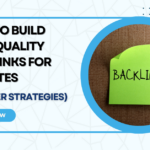In today’s digital environment, search engine optimization (SEO) is crucial for businesses and website owners to grow their online presence and generate organic traffic. An SEO audit is a crucial process that ensures your website adheres to best practices and identifies areas that require improvement. This SEO audit checklist guide will walk you through each essential stage of analyzing and optimizing your website for the highest potential search engine performance.
What is an SEO Audit?
An SEO audit provides a complete evaluation of a website’s search engine optimisation performance. It involves analyzing various elements and factors that impact a website’s visibility, rankings, and organic traffic in search engine results pages (SERPs). The SEO audit’s primary goal is to identify as many underlying issues that have a negative impact on organic search performance as feasible and develop an action plan to enhance the website’s SEO strategy.
Furthermore, SEO audits thoroughly review websites to evaluate factors that influence how well you do in SERPs or search engine results pages. These elements include the on-page and off-page technical SEO performance of a website. This also involves analyzing website structure, URL optimization, meta tags, content quality and relevance, keyword usage, backlinks, user experience, mobile optimization, site speed, and more.
SEO Audit Checklist 2023: What are the Benefits of an SEO Audit?
Identifying Technical Issues
A website or server may have technical problems due to recent upgrades or updates. As a result, conducting a technical SEO audit is a great way to look into the workings of your website. This helps uncover technical problems that may hinder search engine crawling and indexing, such as broken links, duplicate content, improper redirects, and server errors.
Enhancing Keyword Optimization
Learning how content performs and the most popular search keywords before writing content is crucial. An SEO audit can help find the best keywords for any company, industry, or type of business. Furthermore, it concentrates your marketing efforts and identifies the appropriate target market to ensure that the target keywords are incorporated effectively in title tags, headings, meta descriptions, and content.
Assessing Content Quality and Relevance
An audit examines the quantity and quality of backlinks pointing to a website, locating spammy or harmful links, and chances to develop high-quality backlinks ethically.
Evaluating Backlink Profile
An audit analyzes the quality and quantity of backlinks pointing to the website, identifying toxic or spammy links and opportunities for acquiring high-quality backlinks through ethical link-building strategies.
Improving User Experience
User experience is a crucial component of SEO. An audit aids in finding usability problems, improving website navigation, speeding up page loads, and enhancing mobile compatibility, all of which boost user engagement and happiness.
Staying Updated with SEO Best Practices
In order to maintain their website’s optimization and competitiveness in search engine rankings, website owners can benefit from an audit by keeping up with the most recent SEO trends, algorithm upgrades, and best practices.
SEO Audit Checklist for 2023
1. Define Your Business Goals
Start by establishing and understanding your business objectives clearly. Decide whether you want to expand into new markets, get more leads, or promote your brand’s visibility. Your strategic objectives should directly support these broad corporate goals.
2. Understand Your Target Audience
Learn as much as you can about your target market’s search habits. Identify their characteristics, preferences, requirements, and problems. This information will enable you to effectively customize your SEO strategy to attract and engage your ideal clients.
3. Set Realistic and Time-Bound Goals
Establish time-bound, explicit targets that align with your business’s objectives. For instance, you might want to boost organic search traffic by a given percentage, enhance rankings for specific keywords, or raise the percentage of organic search traffic that converts.
4. Conduct a Competitive Analysis
Assess the competitive landscape within your industry. Determine your primary rivals, then examine their SEO tactics and results. This study will assist you in locating opportunities to stand out from the crowd and outperform your rivals.
5. Conduct Keyword Research and Analysis
Start with defining target keywords that are relevant to your industry, goods, or services if you want to undertake effective keyword research and analysis. Consider the search volume, competition, and keyword intent while selecting the best keywords. Look for long-tail keywords that can also be optimized for particular content. When selecting keywords, take into account search patterns and user intent.
6. Evaluate On-Page Optimization
Review and improve header tags, meta descriptions, and title tags for on-page optimization so that they are optimized for your target keywords. Make sure your URLs are simple to use and include pertinent keywords. Improve the readability and keyword density of your text. Include pertinent keywords in file names and alt tags for images. Create a hierarchy of material on your website by using internal linking.
7. Assess Website Structure and Navigation
Examine your website’s navigation and structure. Make sure your website has a logical structure and appropriate hierarchy for navigation. Look for broken links and resolve any redirects to guarantee a seamless user experience. In addition, improve your robots.txt file and XML sitemap to make crawling and indexing easier. Use breadcrumbs to simplify navigation and improve user experience. Create and improve a user-friendly 404 error page as well to direct people back to pertinent content.
8. Evaluate Site Speed and Mobile-Friendliness
SEO variables such as website speed and mobile usability are crucial for a better user experience. That said, speeding up your website’s loading, such as reducing file sizes, compressing pictures, and minifying CSS and JavaScript code, can provide quicker content delivery. Also, make sure your website is responsive to different devices and mobile-friendly. You can utilize Google’s Mobile-Friendly Test to find and fix any mobile compatibility problems.
9. Assess Backlink Profile
Assess your website’s backlink profile to determine the standard and relevance of incoming links. Focus on creating high-quality backlinks by using ethical link-building strategies, including guest blogging, influencer outreach, and content promotion. Watch your competitors’ backlinks to identify potential acquisition prospects.
10. Match SEO Activities with Other Marketing Efforts
Make sure your SEO goals are in line with your overall marketing strategies. To develop a cohesive and integrated marketing plan, sync your SEO efforts with those of other channels like paid advertising, social media, and content marketing.
11. Monitor Website Analytics
Install Google Analytics and Google Search Console to track website analytics. Keep track of important statistics like the bounce rate, conversion rate, and organic traffic. Make data-driven decisions for website optimization by analyzing user behavior. Create reports on a regular basis to monitor progress, pinpoint problem areas, and keep up with how your website is doing.
12. Regularly Review and Adjust
Remember that the goals of a strategy can change. Review and modify your objectives and plans on a regular basis based on market dynamics, business developments, algorithm upgrades, and the success of your SEO campaigns. Maintaining an advantage in the always-changing SEO environment requires flexibility and agility.
SEO Audit Checklist 2023 Conclusion
In the ever-evolving digital landscape, conducting an SEO audit is essential for optimizing your website’s performance and achieving online success. Following this comprehensive checklist and adapting to the latest SEO trends can enhance your website’s visibility, rankings, and organic traffic. If you want to ensure the SEO success of your website in 2023 and beyond, you need to collaborate with a reputable and knowledgeable SEO agency.
Contact us today to schedule a consultation and learn more about how our SEO experts can assist you with optimizing your website for better search engine performance. Don’t miss the chance to improve your web visibility and draw more organic traffic. Get in touch with us now.










